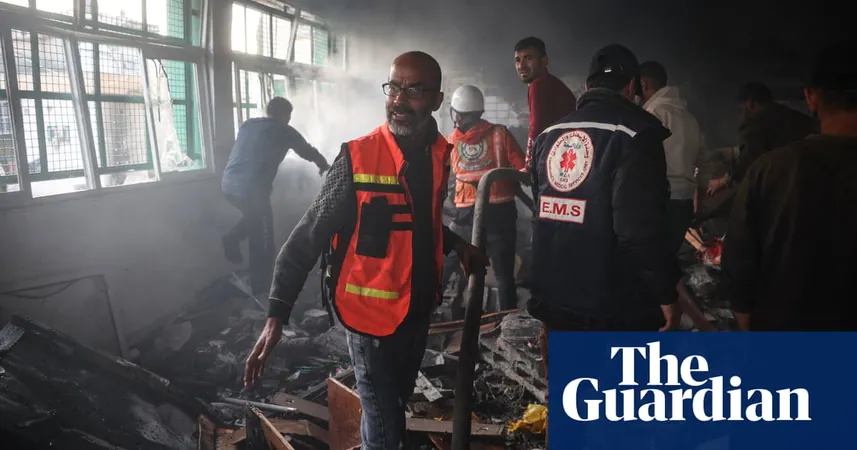
Shocking US Veto Blocks UN Ceasefire Resolution in Gaza
2024-11-20
Author: Lok
US Veto of UN Ceasefire Resolution
In a move that has sparked outrage and controversy, the United States has vetoed a United Nations Security Council resolution aimed at implementing a ceasefire in the ongoing conflict in Gaza. This resolution, which was heavily supported with a vote of 14-1, called for “an immediate, unconditional, and permanent ceasefire” between Israel and Hamas, as well as the “immediate and unconditional release of all hostages.”
Rationale Behind the Veto
During the vote, the US offered a rationale, arguing that the resolution could potentially strengthen Hamas' position, thereby exacerbating the crisis. Israeli UN ambassador Danny Danon commented that the resolution was “not a path to peace,” instead labeling it a “road map to more terror, more suffering and more bloodshed.”
Humanitarian Crisis in Gaza
The conflict, reignited by a deadly Hamas incursion on October 7, 2023, has resulted in a staggering humanitarian crisis. Recent reports indicate that nearly 44,000 people have died in Gaza, primarily civilians, while the health ministry’s numbers have been deemed credible by the United Nations. Efforts to resolve the hostage situation remain critical, as of the 251 individuals captured, 97 are still unaccounted for — 34 of whom the Israeli military has stated are believed to be deceased.
Severe Shortages and Urgency for Ceasefire
The humanitarian situation in Gaza is dire, with the UN estimating that the conflict has displaced almost all of Gaza's 2.4 million residents. The region has been subject to severe shortages of food, water, and medical supplies, further escalating the urgency of a ceasefire. Faced with these grim realities, Hamas condemned the United States, labeling its support for Israel as complicity in “the aggression against our people,” which they claim inflicts violence upon innocent civilians.
International Community's Response
The response from the international community reveals a deepening divide. The US decision is not unprecedented, as it has regularly utilized its veto power concerning resolutions centered on the Israeli-Palestinian conflict — a trend that has been echoed by China and Russia as well. There were previous attempts to broker peace, including a call for pause during Ramadan and a US-backed plan that proposed a multi-phased ceasefire, both of which failed to yield results.
Diplomatic Discussions and Frustration
Amidst these tensions, the UN Security Council struggles to maintain a unified stance. Diplomatic discussions have highlighted a clear frustration regarding the lack of progress, with some representatives expressing regret over the US veto and its implications for international peace and security.
Hope for Change in US Policy
Some observers are cautiously hopeful that the change in the US administration, following Donald Trump’s recent victory, may lead to a shift in US policy towards a more balanced approach in the coming weeks. This harkens back to the end of Barack Obama’s presidency when a UN resolution against Israeli settlements was passed, marking a notable deviation from longstanding US support for Israel on the issue.
Condemnation from Human Rights Organizations
Human Rights Watch has condemned the recent US veto, accusing it of facilitating Israel’s ongoing military actions in Gaza, labeling it as a measure ensuring “impunity” amid what they describe as crimes against Palestinians.
Calls for Humanitarian Assistance
As global outrage continues to mount, the vetoed resolution included calls for “safe and unhindered entry of humanitarian assistance at scale,” particularly for the hardest-hit northern Gaza, stressing the urgent need for relief efforts in the face of mounting casualties and suffering faced by civilians in the region. Palestinian ambassador Majed Bamya expressed his condemnation of the veto, stating that there was “no justification whatsoever for vetoing a resolution trying to stop atrocities.”
Impact on International Diplomacy
The implications of these developments underscore a critical juncture in international diplomacy surrounding the Israeli-Palestinian conflict, leaving many to wonder what the future holds for Gaza and its beleaguered residents as the fighting continues unabated.




 Brasil (PT)
Brasil (PT)
 Canada (EN)
Canada (EN)
 Chile (ES)
Chile (ES)
 España (ES)
España (ES)
 France (FR)
France (FR)
 Hong Kong (EN)
Hong Kong (EN)
 Italia (IT)
Italia (IT)
 日本 (JA)
日本 (JA)
 Magyarország (HU)
Magyarország (HU)
 Norge (NO)
Norge (NO)
 Polska (PL)
Polska (PL)
 Schweiz (DE)
Schweiz (DE)
 Singapore (EN)
Singapore (EN)
 Sverige (SV)
Sverige (SV)
 Suomi (FI)
Suomi (FI)
 Türkiye (TR)
Türkiye (TR)